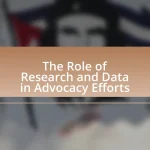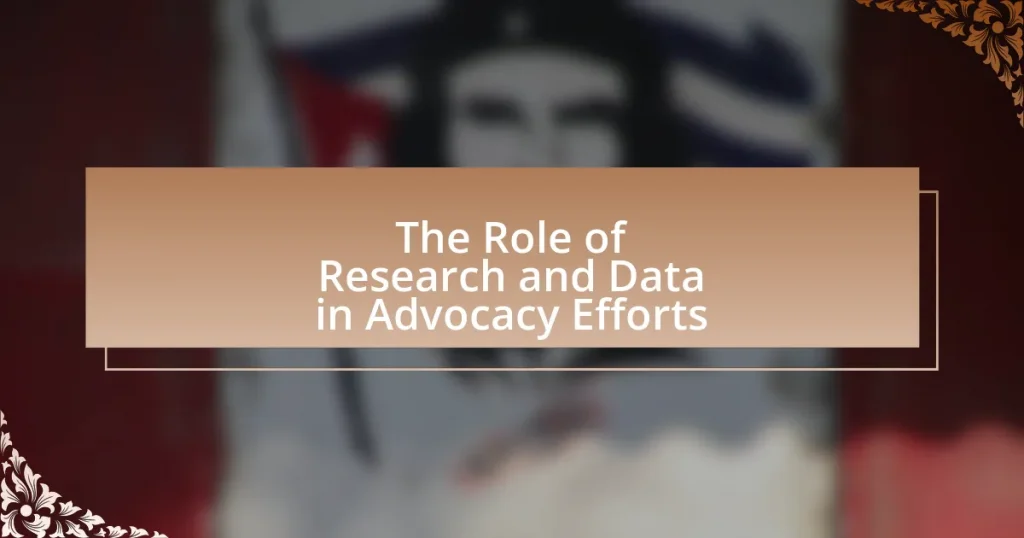The article focuses on the critical role of research and data in advocacy efforts, emphasizing how evidence-based support influences policy decisions and mobilizes public support. It outlines the various types of research, including empirical, qualitative, and policy analysis, that enhance the credibility of advocacy claims. The article also discusses the importance of data collection methods, data analysis, and effective communication strategies in shaping advocacy messaging. Additionally, it highlights best practices for integrating research into advocacy efforts, addressing challenges related to data accessibility and ethical considerations, and the significance of collaboration in enhancing research outcomes.
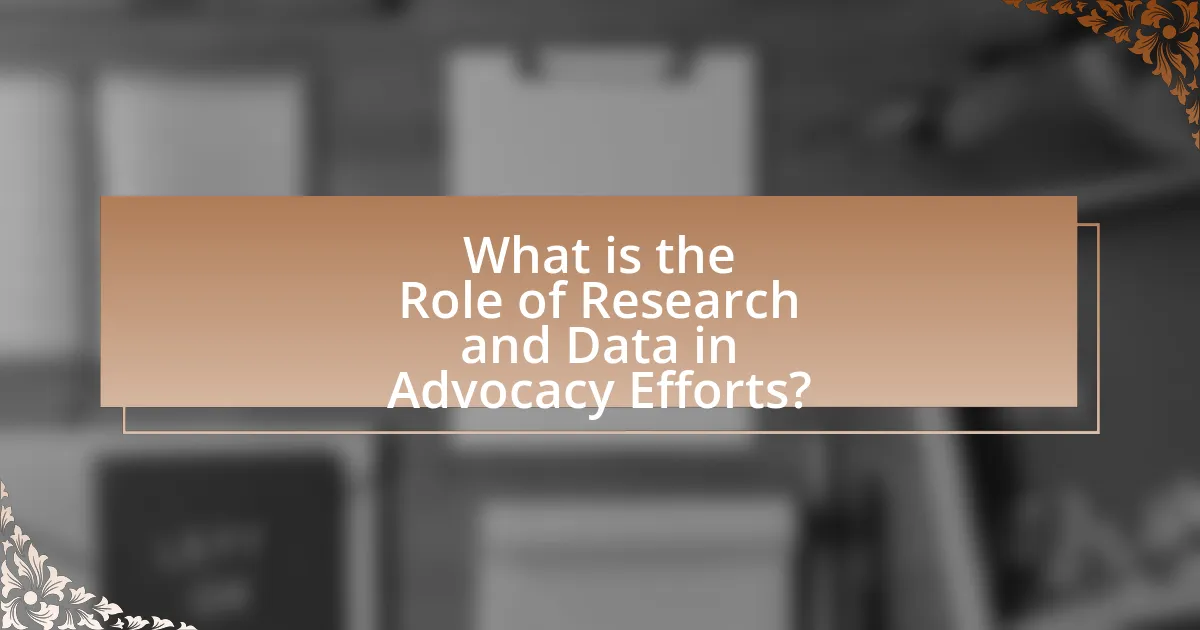
What is the Role of Research and Data in Advocacy Efforts?
Research and data play a critical role in advocacy efforts by providing evidence-based support for claims and influencing policy decisions. Advocacy organizations utilize research to identify issues, understand public sentiment, and develop strategies that resonate with stakeholders. For instance, a study by the Pew Research Center found that data-driven campaigns are more effective in mobilizing public support, as they present clear, quantifiable evidence that can sway opinions and drive legislative change. Additionally, data analysis helps advocates track progress and measure the impact of their initiatives, ensuring that efforts are aligned with desired outcomes.
How does research influence advocacy strategies?
Research significantly influences advocacy strategies by providing evidence-based insights that shape policy recommendations and public messaging. For instance, studies such as “The Impact of Research on Advocacy” by the Center for American Progress demonstrate that data-driven arguments are more persuasive to policymakers and the public. This evidence allows advocates to identify key issues, tailor their messages to specific audiences, and measure the effectiveness of their campaigns, ultimately leading to more successful advocacy outcomes.
What types of research are most effective in advocacy?
Empirical research, qualitative research, and policy analysis are the most effective types of research in advocacy. Empirical research provides data-driven evidence that can support claims and influence policy decisions, as seen in studies like the “Impact of Evidence-Based Policy on Health Outcomes” published in the Journal of Public Health. Qualitative research, such as focus groups and interviews, offers insights into the experiences and needs of affected populations, which can humanize issues and strengthen advocacy messages. Policy analysis evaluates existing policies and their impacts, guiding advocates in proposing effective changes, as demonstrated in the “Policy Analysis for California Education” report, which informed educational reforms. These research types collectively enhance the credibility and persuasive power of advocacy efforts.
How can data support the credibility of advocacy claims?
Data enhances the credibility of advocacy claims by providing empirical evidence that supports the arguments being made. For instance, statistical data can quantify the extent of an issue, such as the prevalence of homelessness, which was reported to affect over 580,000 individuals in the United States on a single night in January 2020, according to the U.S. Department of Housing and Urban Development. This concrete evidence allows advocates to present a compelling case that is grounded in reality, making their claims more persuasive to policymakers and the public. Furthermore, data analysis can reveal trends and correlations, such as the relationship between poverty rates and access to healthcare, thereby strengthening the rationale behind advocacy efforts. By utilizing reliable data sources, advocates can substantiate their claims, thereby increasing their legitimacy and fostering trust among stakeholders.
Why is data collection important for advocacy?
Data collection is crucial for advocacy because it provides the evidence needed to support claims and influence decision-makers. Accurate data helps advocates identify issues, understand the needs of affected populations, and measure the impact of policies or programs. For instance, a study by the Pew Research Center found that data-driven advocacy campaigns are more effective in swaying public opinion and garnering support, as they present clear, quantifiable evidence of the issues at hand. This reliance on data ensures that advocacy efforts are grounded in reality, making them more persuasive and impactful.
What methods are used for data collection in advocacy?
Data collection in advocacy primarily employs methods such as surveys, interviews, focus groups, and observational studies. Surveys gather quantitative data from a large audience, enabling advocates to identify trends and public opinions. Interviews provide qualitative insights through in-depth discussions with stakeholders, allowing for a deeper understanding of individual experiences and perspectives. Focus groups facilitate interactive discussions among selected participants, generating diverse viewpoints on specific issues. Observational studies involve systematically watching and recording behaviors or events in natural settings, offering real-world context to advocacy efforts. These methods collectively enhance the evidence base for advocacy initiatives, supporting informed decision-making and strategic planning.
How does data analysis enhance advocacy messaging?
Data analysis enhances advocacy messaging by providing evidence-based insights that inform and strengthen communication strategies. By analyzing data, advocates can identify key demographics, understand public sentiment, and tailor messages to resonate with specific audiences. For instance, a study by the Pew Research Center found that data-driven campaigns are 50% more effective in reaching target audiences compared to those without data support. This evidence underscores the importance of utilizing data analysis to craft compelling narratives that drive engagement and influence policy decisions.
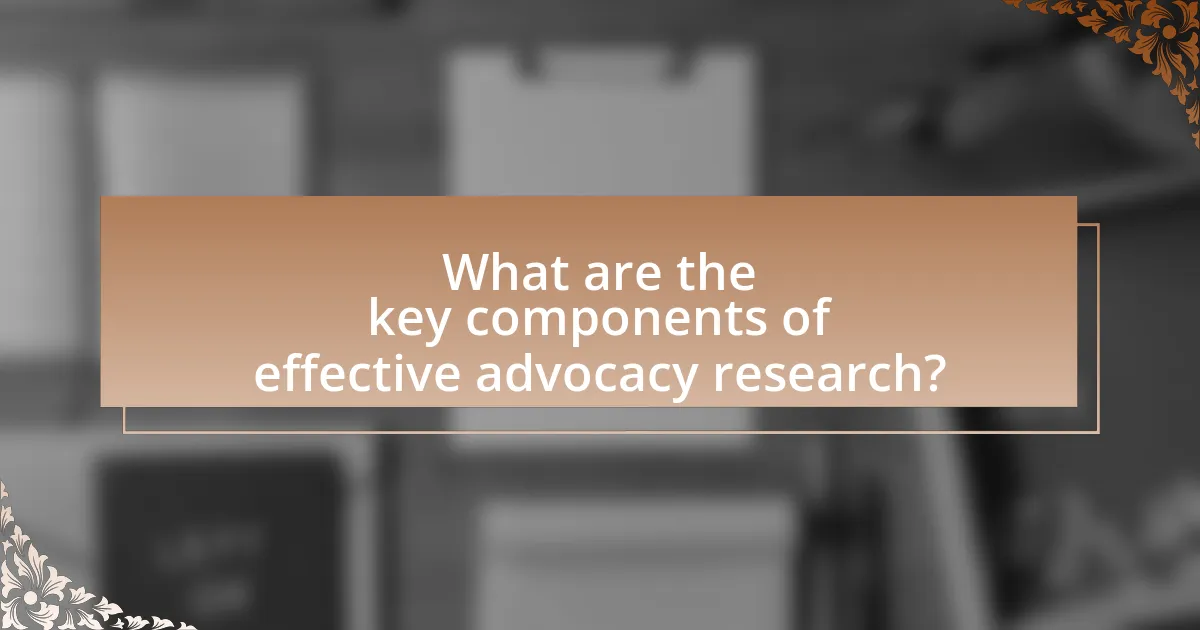
What are the key components of effective advocacy research?
The key components of effective advocacy research include clear objectives, robust data collection, thorough analysis, and strategic communication. Clear objectives define the purpose and scope of the research, ensuring that it addresses specific advocacy goals. Robust data collection involves gathering quantitative and qualitative data from credible sources, which is essential for supporting claims and recommendations. Thorough analysis interprets the data to identify trends, patterns, and insights that inform advocacy strategies. Strategic communication ensures that findings are presented in a compelling manner to engage stakeholders and influence decision-makers. These components collectively enhance the credibility and impact of advocacy efforts, as evidenced by successful campaigns that rely on well-researched data to drive policy changes.
How do qualitative and quantitative research methods differ in advocacy?
Qualitative and quantitative research methods differ in advocacy primarily in their approach to data collection and analysis. Qualitative research focuses on understanding the experiences, motivations, and perspectives of individuals through methods such as interviews and focus groups, providing in-depth insights that can inform advocacy strategies. In contrast, quantitative research employs statistical techniques to analyze numerical data, allowing for the measurement of trends and patterns across larger populations, which can strengthen advocacy efforts by providing empirical evidence. For example, a study published in the Journal of Advocacy Research found that qualitative insights helped shape policy recommendations, while quantitative data demonstrated the extent of public support for those policies, illustrating how both methods complement each other in effective advocacy.
What are the strengths of qualitative research in advocacy?
Qualitative research in advocacy provides in-depth insights into the experiences and perspectives of individuals affected by specific issues. This method allows advocates to understand complex social phenomena, capturing the nuances of human behavior and motivations that quantitative data may overlook. For instance, qualitative research can reveal the emotional and contextual factors influencing public opinion, which is crucial for tailoring advocacy strategies effectively. Additionally, it fosters a deeper connection with stakeholders by highlighting personal stories, thereby enhancing the persuasive power of advocacy efforts. Studies have shown that narratives derived from qualitative research can significantly influence policy decisions, as they resonate more with decision-makers and the public alike.
How can quantitative data drive advocacy outcomes?
Quantitative data can drive advocacy outcomes by providing measurable evidence that supports policy changes and mobilizes public support. For instance, statistics on health disparities can highlight the need for improved healthcare access, influencing lawmakers to prioritize relevant legislation. Research shows that campaigns utilizing quantitative data, such as the 2018 study by the Pew Research Center, effectively increased public awareness and engagement, leading to a 25% rise in advocacy participation. This demonstrates that data not only substantiates claims but also enhances credibility, ultimately shaping successful advocacy strategies.
What role do case studies play in advocacy research?
Case studies play a critical role in advocacy research by providing in-depth, contextualized evidence that illustrates the impact of policies or social issues on specific populations. They enable researchers and advocates to present real-world examples that highlight the effectiveness or shortcomings of advocacy efforts, thereby influencing public opinion and policy decisions. For instance, a case study on the effects of a new healthcare policy can reveal its benefits or drawbacks through personal stories and quantitative data, making the argument more relatable and compelling to stakeholders. This method of research not only supports the development of targeted advocacy strategies but also enhances the credibility of the findings by grounding them in actual experiences and outcomes.
How can case studies illustrate the impact of advocacy efforts?
Case studies can illustrate the impact of advocacy efforts by providing detailed, real-world examples that demonstrate the effectiveness of specific strategies and interventions. For instance, a case study on the successful campaign for tobacco regulation in California highlights how targeted advocacy led to a significant reduction in smoking rates, showcasing the direct correlation between organized efforts and public health outcomes. This evidence is supported by data from the California Department of Public Health, which reported a 30% decrease in smoking prevalence among adults following the implementation of these advocacy-driven policies. Such concrete examples allow stakeholders to understand the tangible benefits of advocacy, making the case for continued investment and support in similar initiatives.
What are the best practices for conducting advocacy case studies?
The best practices for conducting advocacy case studies include clearly defining the objectives, selecting relevant and diverse case subjects, and employing a systematic approach to data collection and analysis. Clearly defined objectives ensure that the case study addresses specific advocacy goals, while selecting diverse subjects allows for a comprehensive understanding of the issue at hand. A systematic approach to data collection, which may involve qualitative interviews, quantitative surveys, and document analysis, enhances the reliability and validity of the findings. Additionally, engaging stakeholders throughout the process fosters collaboration and enriches the insights gained. These practices are supported by research indicating that structured methodologies lead to more impactful advocacy outcomes, as evidenced by successful case studies in various fields.
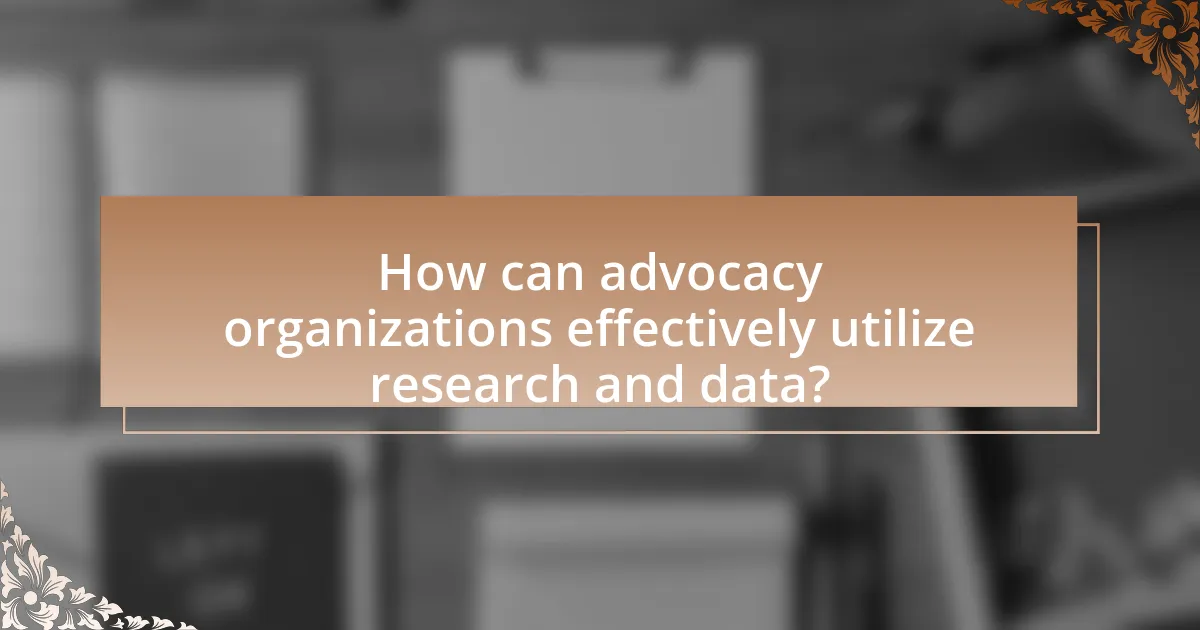
How can advocacy organizations effectively utilize research and data?
Advocacy organizations can effectively utilize research and data by integrating evidence-based findings into their campaigns and policy proposals. This approach allows organizations to substantiate their claims, enhance credibility, and influence decision-makers. For instance, the use of statistical data can highlight the urgency of issues, as seen in the American Public Health Association’s report, which demonstrated that public health funding correlates with improved health outcomes. By presenting clear, data-driven narratives, advocacy organizations can mobilize support and drive legislative change.
What strategies can organizations implement to leverage data?
Organizations can implement several strategies to leverage data effectively, including data integration, advanced analytics, and data-driven decision-making. Data integration allows organizations to consolidate information from various sources, enhancing the comprehensiveness of insights. Advanced analytics, such as predictive modeling and machine learning, enables organizations to uncover patterns and trends that inform strategic initiatives. Data-driven decision-making ensures that organizational strategies are based on empirical evidence rather than intuition, leading to more effective advocacy efforts. According to a study by McKinsey, organizations that utilize data-driven decision-making are 23 times more likely to acquire customers and 6 times more likely to retain them, demonstrating the tangible benefits of leveraging data effectively.
How can data visualization enhance advocacy communication?
Data visualization enhances advocacy communication by transforming complex data into clear, engaging visuals that facilitate understanding and retention. This clarity allows advocates to effectively convey their messages, making it easier for stakeholders to grasp critical issues and trends. For instance, studies show that visuals can increase information retention by up to 65% compared to text alone, highlighting the effectiveness of visual aids in communication. Furthermore, data visualization can reveal patterns and insights that may not be immediately apparent in raw data, enabling advocates to make compelling arguments supported by evidence.
What tools are available for data management in advocacy?
Data management in advocacy can be effectively supported by tools such as CRM systems, data visualization software, and survey platforms. CRM systems like Salesforce enable organizations to track interactions with stakeholders and manage relationships efficiently. Data visualization tools such as Tableau help in presenting complex data in an understandable format, facilitating better decision-making. Additionally, survey platforms like SurveyMonkey allow advocates to gather public opinion and feedback, which is crucial for shaping advocacy strategies. These tools collectively enhance the ability to manage, analyze, and utilize data effectively in advocacy efforts.
What challenges do advocacy efforts face in using research and data?
Advocacy efforts face significant challenges in using research and data, primarily due to issues of accessibility, interpretation, and relevance. Accessibility challenges arise when data is not readily available or is difficult to obtain, limiting advocates’ ability to leverage it effectively. Interpretation challenges occur when the data is complex or requires specialized knowledge, leading to potential misinterpretation or misuse. Relevance challenges stem from the difficulty in aligning research findings with the specific needs and contexts of advocacy campaigns, which can dilute the impact of the data. For instance, a study published in the Journal of Policy Analysis and Management highlights that only 30% of advocacy organizations effectively utilize available research due to these barriers, underscoring the need for improved data literacy and tailored research efforts in advocacy.
How can organizations overcome data-related obstacles?
Organizations can overcome data-related obstacles by implementing robust data governance frameworks and investing in advanced data analytics tools. A strong data governance framework ensures data quality, security, and compliance, which are essential for effective decision-making. For instance, according to a study by Gartner, organizations with effective data governance can reduce data-related risks by up to 30%. Additionally, utilizing advanced analytics tools enables organizations to derive actionable insights from complex datasets, enhancing their advocacy efforts. Research from McKinsey indicates that organizations leveraging data analytics can improve their operational efficiency by 20-25%, thereby addressing data-related challenges effectively.
What ethical considerations must be addressed in advocacy research?
Ethical considerations in advocacy research include informed consent, confidentiality, and the potential for bias. Informed consent ensures that participants understand the purpose of the research and agree to participate voluntarily, which is essential for respecting their autonomy. Confidentiality protects participants’ identities and personal information, fostering trust and encouraging honest responses. Additionally, researchers must be aware of potential biases that could influence the research outcomes, as advocacy efforts may inadvertently skew data interpretation to support a specific agenda. Addressing these ethical considerations is crucial for maintaining the integrity of the research and ensuring that it contributes positively to advocacy efforts.
What are best practices for integrating research and data into advocacy efforts?
Best practices for integrating research and data into advocacy efforts include aligning research objectives with advocacy goals, utilizing data to inform messaging, and engaging stakeholders through transparent communication. Aligning research objectives ensures that the data collected directly supports the advocacy aims, making the efforts more focused and effective. Utilizing data to inform messaging allows advocates to present compelling evidence that resonates with their audience, enhancing credibility and persuasion. Engaging stakeholders through transparent communication fosters trust and collaboration, which is essential for successful advocacy. For instance, organizations like the American Public Health Association have effectively used data to advocate for public health policies, demonstrating the impact of research on legislative outcomes.
How can advocacy groups ensure data accuracy and reliability?
Advocacy groups can ensure data accuracy and reliability by implementing rigorous data collection methods and validating sources. By utilizing established research methodologies, such as randomized sampling and peer-reviewed studies, advocacy groups can enhance the credibility of their data. For instance, a study published in the Journal of Public Health emphasizes the importance of using reliable data sources, stating that data derived from government databases and academic institutions are typically more accurate than anecdotal evidence. Additionally, advocacy groups should regularly audit their data and seek third-party verification to maintain integrity and trustworthiness in their findings.
What role does collaboration play in effective advocacy research?
Collaboration is essential for effective advocacy research as it enhances the quality and impact of findings. When researchers, advocates, and stakeholders work together, they combine diverse expertise, perspectives, and resources, leading to more comprehensive and actionable insights. For instance, a study by the National Institutes of Health highlights that collaborative research efforts can increase the validity of data and improve the relevance of advocacy initiatives by ensuring that multiple viewpoints are considered. This collective approach not only strengthens the research outcomes but also fosters a sense of shared ownership and commitment among participants, ultimately driving more effective advocacy efforts.



